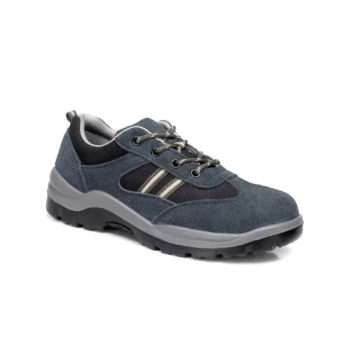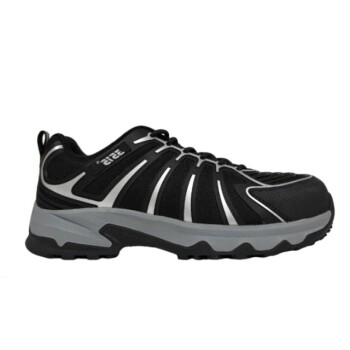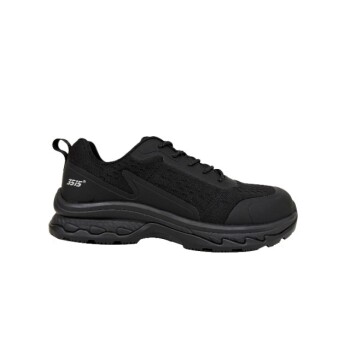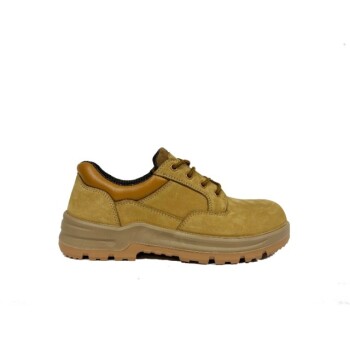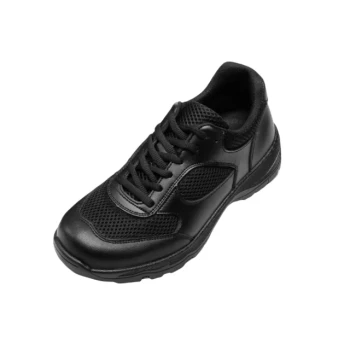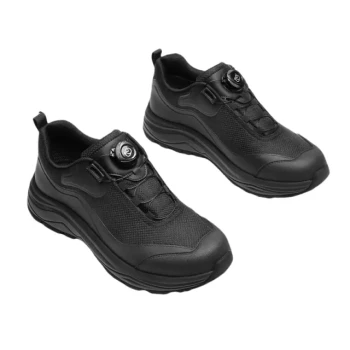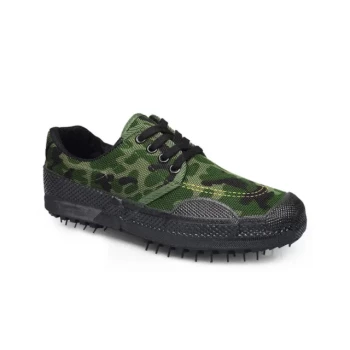Unlike Europe, Asia does not have a single, unified safety shoe standard. Instead, compliance is managed on a country-by-country basis, with each nation establishing its own distinct set of regulations. Key standards include China's GB 21148, Japan's JIS T8101, and India's IS 15298 series, among several others across the continent.
The critical takeaway for operating in Asia is that safety footwear compliance is a localized responsibility. A shoe certified for use in one Asian country is not automatically compliant in another, requiring careful verification against each market's specific regulations.
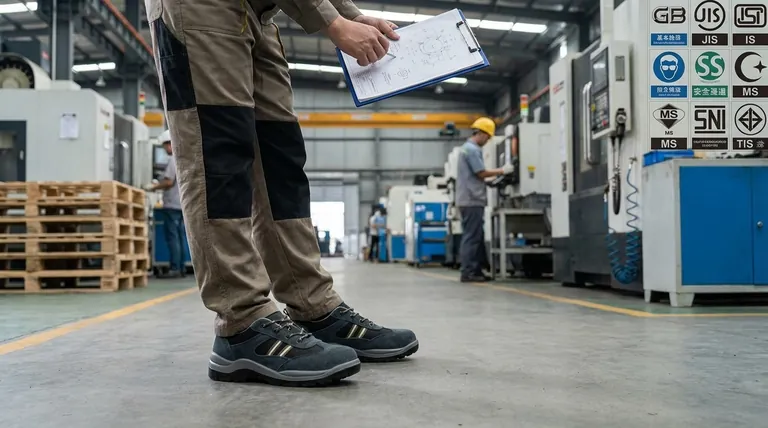
The Fragmented Regulatory Landscape
The primary challenge in understanding Asian safety shoe standards is recognizing that there is no central authority. Unlike the harmonized EN ISO 20345 standard used across the European Union, Asia's approach is entirely decentralized.
No Pan-Asian Standard
There is no equivalent to the European Committee for Standardization (CEN) for Asian PPE. This means manufacturers and safety managers must navigate a patchwork of national rules.
Country-Specific Compliance is Mandatory
This fragmentation means that a safety shoe meeting Japan's rigorous JIS standard cannot be assumed to be compliant for use in China or Malaysia without separate verification and certification against those local standards.
Standards Reflect Local Requirements
Each national standard is developed by that country's official standards body to meet its specific industrial and regulatory needs. This is why direct reciprocity between standards is rare.
A Breakdown of Key National Standards
To ensure compliance, you must identify and adhere to the specific standard for your country of operation. The following are the principal standards for several key Asian markets.
China: GB 21148 & An Series
China's primary standard for personal protective footwear is GB 21148. It is often accompanied by designations like An1 through An5, which specify different levels of impact resistance for the protective toe cap.
Japan: JIS T8101
The Japanese Industrial Standards (JIS) are highly respected. The relevant standard for safety footwear is JIS T8101, which outlines the requirements and testing methods for protective shoes used in Japan.
India: IS 15298 (Parts I-IV)
India uses a multi-part standard. IS 15298 is broken down to cover different aspects and types of footwear:
- Part I: Test methods
- Part II: Requirements for safety footwear
- Part III: Requirements for protective footwear
- Part IV: Requirements for occupational footwear
Singapore: SS 513
The standard in Singapore is SS 513 (formerly SS 105). It is largely based on the European EN ISO 20345 standard, which can simplify compliance for manufacturers familiar with the EN system, but local certification is still key.
Malaysia: SIRIM MA 1598:1998
In Malaysia, the standard is MA 1598:1998, and compliance is typically certified by SIRIM, the national standards and quality organization.
Other Key Standards
Other national standards you must be aware of include:
- Indonesia: SNI 0111:2009
- Thailand: TIS 523-2011
Common Pitfalls to Avoid
Navigating this landscape presents several challenges that can lead to non-compliance, supply chain disruptions, and compromised worker safety.
The Myth of "Universal" Acceptance
A common mistake is assuming that footwear certified to a major global standard, such as Europe's EN ISO 20345 or the US ASTM F2413, will be automatically accepted. While these standards are excellent benchmarks, many Asian countries still mandate testing and certification to their own local standard.
Overlooking Local Certification Bodies
Even if a shoe is designed to meet a local standard, it often must be certified by a nationally recognized body. In Malaysia, for example, this is SIRIM. Failure to obtain this local certification mark can render the product non-compliant.
Supply Chain Complexity
For multinational companies operating across Asia, managing PPE procurement is a significant task. You cannot source a single "Asia-compliant" safety shoe; you must source specific models that are certified for each country where you have operations.
Making the Right Choice for Your Goal
Your strategy for ensuring compliance depends entirely on your role and objectives.
- If your primary focus is exporting to a single Asian country: You must identify that nation's specific standard and work with a local or accredited body to achieve certification before market entry.
- If your primary focus is managing workplace safety across multiple Asian facilities: You must develop a compliance matrix that maps each facility's location to the required national footwear standard and ensure your procurement process respects these distinct requirements.
- If your primary focus is manufacturing footwear for Asian markets: You must treat each country as a unique market, designing and testing your products to meet the specific performance and labeling requirements of each national standard.
Ultimately, navigating Asia's safety standards requires a precise, country-by-country approach to guarantee both regulatory compliance and worker protection.
Summary Table:
| Country | Key Safety Shoe Standard | Key Certification Body |
|---|---|---|
| China | GB 21148 (An1-An5) | Standardization Administration of China (SAC) |
| Japan | JIS T8101 | Japanese Industrial Standards Committee (JISC) |
| India | IS 15298 (Parts I-IV) | Bureau of Indian Standards (BIS) |
| Singapore | SS 513 | Enterprise Singapore |
| Malaysia | MA 1598:1998 | SIRIM QAS International |
| Indonesia | SNI 0111:2009 | National Standardization Agency of Indonesia (BSN) |
| Thailand | TIS 523-2011 | Thai Industrial Standards Institute (TISI) |
Simplify Your Asian Safety Footwear Compliance with 3515
Navigating the complex, country-specific safety shoe standards across Asia can be challenging. As a large-scale manufacturer, 3515 produces a comprehensive range of certified footwear for distributors, brand owners, and bulk clients.
We understand the precise requirements of standards like China's GB 21148, Japan's JIS T8101, and India's IS 15298. Our production capabilities encompass all types of safety shoes and boots, designed to meet local certification mandates, ensuring your workforce is protected and your operations remain compliant.
Let us handle the complexity. Contact our experts today to discuss your specific market needs and discover how we can be your trusted manufacturing partner across Asia.
Visual Guide
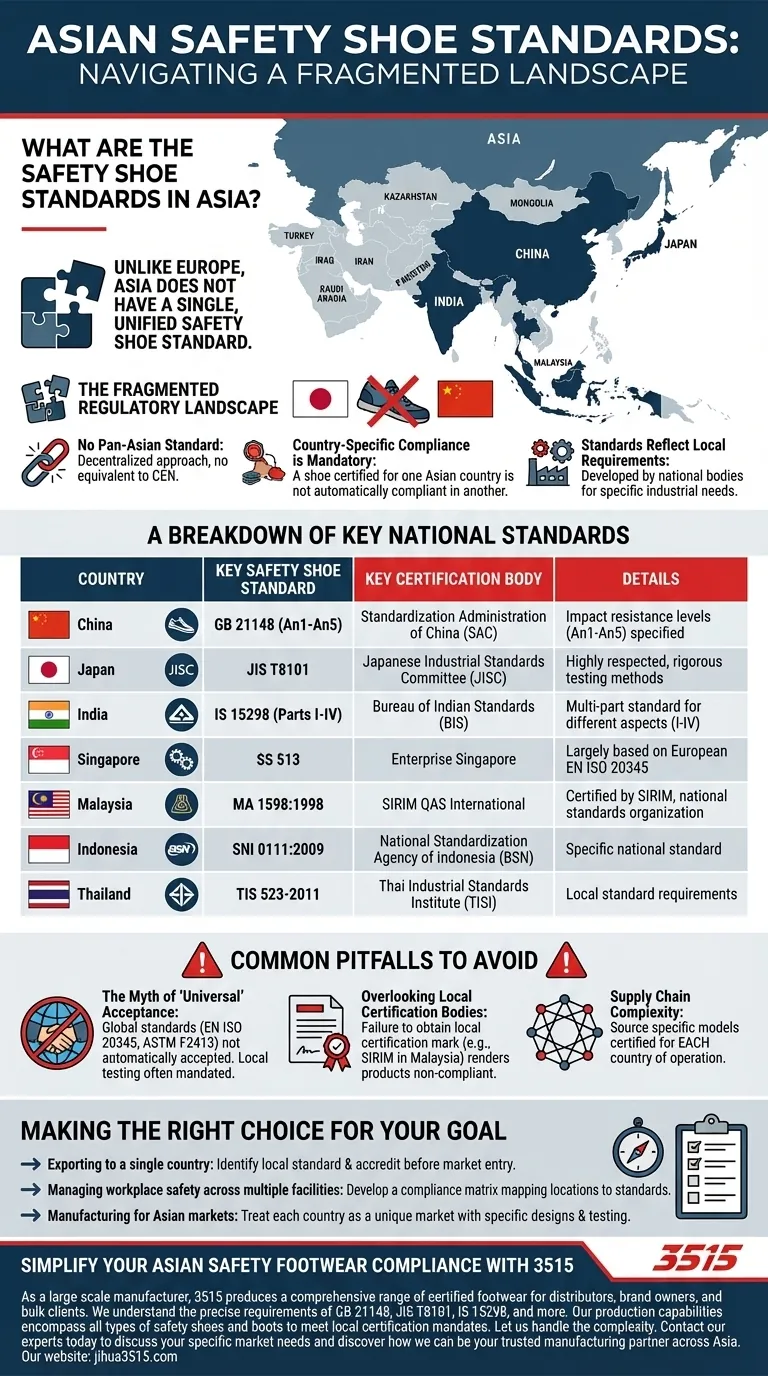
Related Products
- Custom Safety Shoe Manufacturer for Wholesale & OEM Brands
- Premium KPU Athletic Safety Shoes for Wholesale
- Premium Lightweight Safety Shoes for Wholesale & Bulk Orders
- Wholesale Durable Breathable Safety Boots Custom OEM Manufacturer
- Wholesale Leather Safety Boots with Customizable Protective Toe
People Also Ask
- Why is Production Capacity (Mcap) a core parameter in safety shoe contracts? Optimize Supply and Mitigate Risk
- What technical protections do professional-grade safety shoes provide? Guard Your Workforce in Palm Oil Factories
- What are the different types of safety toe boots available? Choose the Right Protection for Your Job
- What protective function do slip-resistant safety shoes provide in confined spaces? Maximize Stability & Grip
- Why are multiple piezoelectric transducers connected in parallel? Boosting Current for Smart Safety Shoes
- What functional design features should be prioritized in safety footwear for older shipyard workers? 5 Key Ergonomics
- Why is the use of professional safety shoes with chemical resistance essential during Mixed Bed Polisher regeneration?
- Why are specialized protective shoes or safety shoes considered essential components in standard infection prevention plans? Crucial for Healthcare Safety & Pathogen Control
